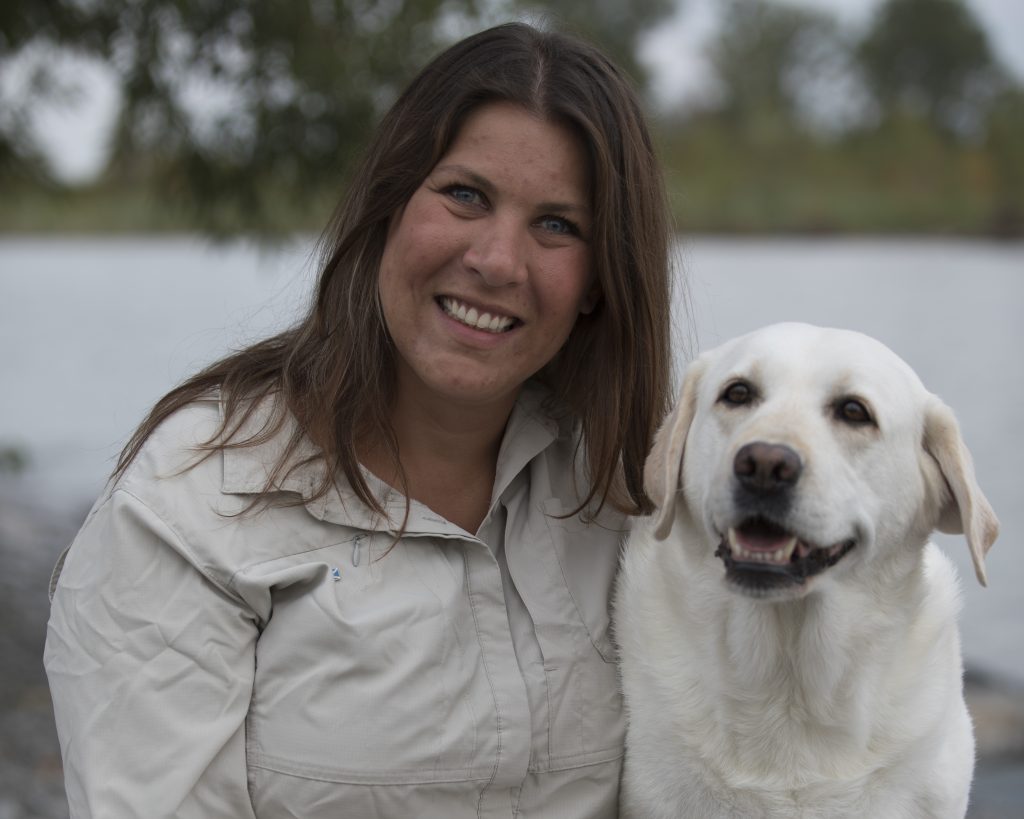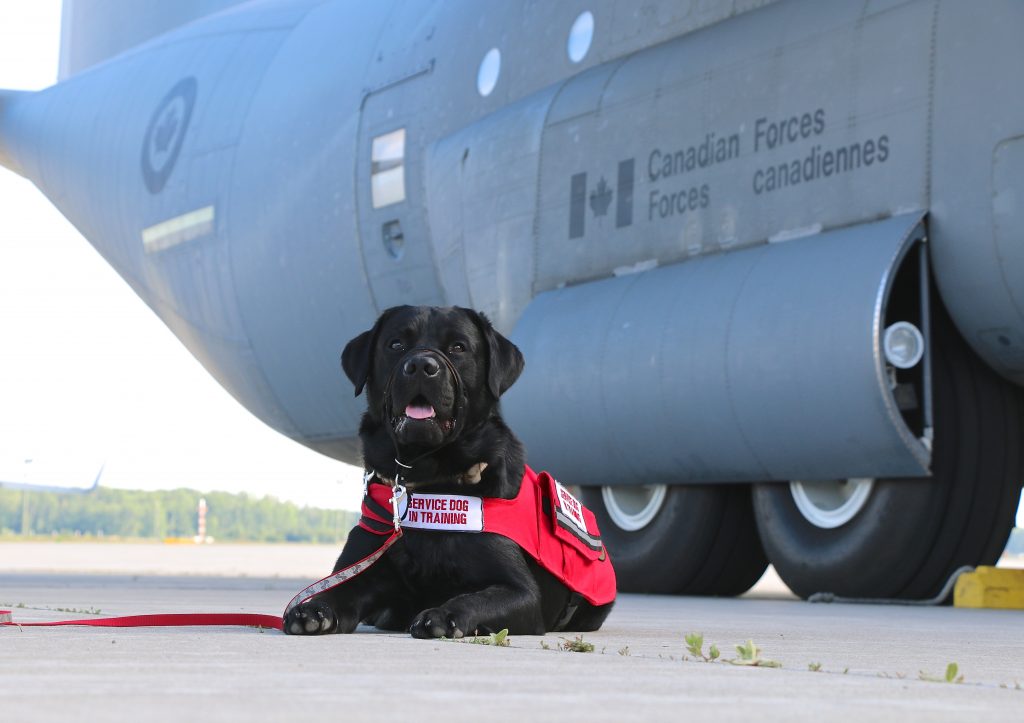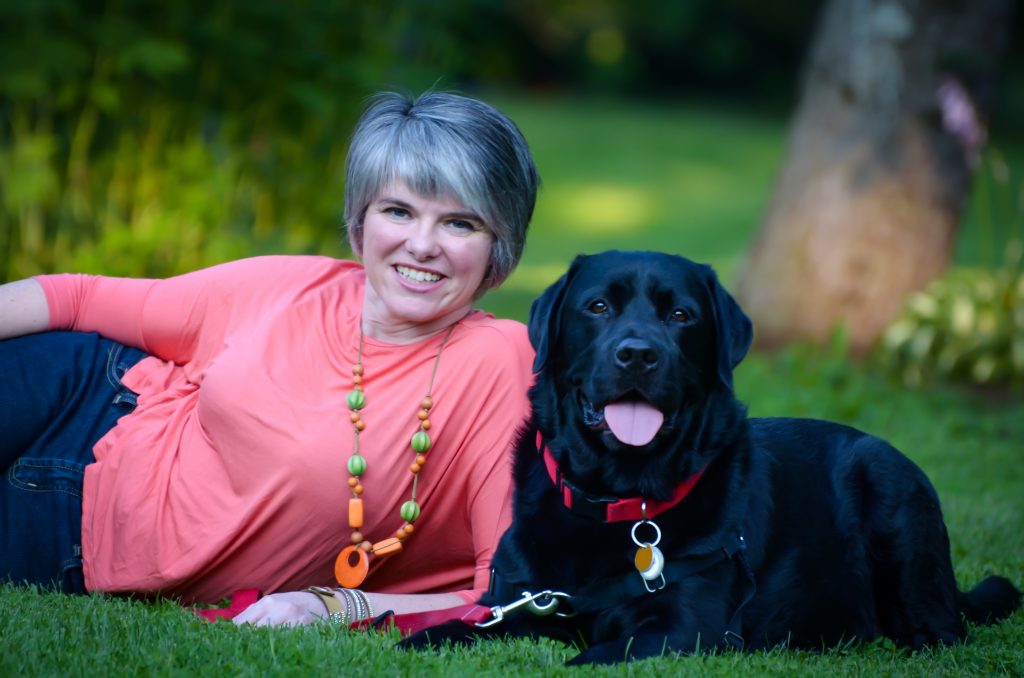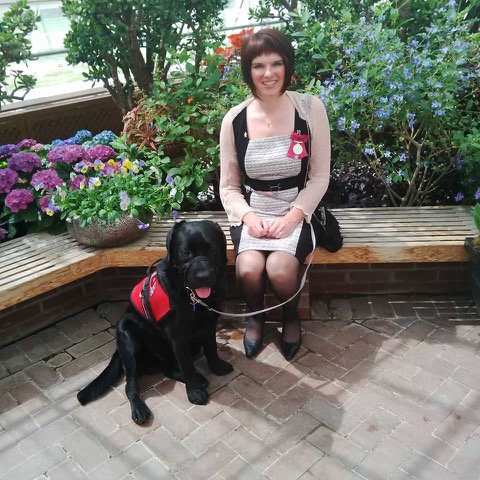By Demii Niles [1]

Lisa Marie Guernon, the founder of the Dominium Assistance Dogs and one of her dogs, Dice. Submitted by: Lisa Marie Guernon
BELLEVILLE- A service dog program for veterans [2]is lacking funds and is at the point they may have to end the program or restructure it, says its founder.
Lisa Marie Guernon [3], a former medic and traffic technician in the Canadian Forces, founded the Dominium Assistances Dogs organization in November 2015. The Dominium Assistance dogs is a non-profit organization benefitting veterans and people who are suffering from post-traumatic stress disorder (PTSD). [4]
Serving the Canadian Forces for 16 years, Guernon noticed there was a high demand for assistance dogs for veterans. Being a professional dog trainer and having been through PTSD herself, she felt compelled to answer the call from her comrades.
Dominium Assistance Dogs is supported solely through fundraising and money she gets from telling her story about PTSD. She receives some funding from breeders, organizations and kennel clubs, but does the majority herself. Guernon said they do not receive any support from veterans’ groups.
To assist one owner with the training a dog already owned by a client costs about $2,500, she said. To purchase a puppy through a breeder and start training it at a young age would cost $10,000 over two years, she said. It is the high cost of buying and training dogs means the organization does not enough funding at this time, Guernon said.
” We will have to cut back on programs and services, and were at a point where we might even have to cut off the Dominion Assistance Dogs,” she said.

Hercules is one of the Dominium Assistance Dogs. Submitted by Lisa Marie Guernon
Guernon said, fundraising through legions and the para-military organization seems impossible because Veteran Affairs, the federal department responsible for retired military, has asked for policies and standards to be in place before it will reimburse the veterans who want canine assistance.
“Psychiatric service dogs are the only dogs that are not recognized by the government for tax exemptions and reimbursement, ” Guernon said. “Until then, all local organizations are incapable of receiving funding (from the government) and are obliged to fundraise and canvas for exposure and financial support.”
She said 100 per cent of the money donated goes straight to the service dogs.
“I don’t take any cuts. None of the directors take any cuts. It (the money raised) goes to vaccines and sometimes promotions. It’s sad but we bought the dogs so we get them medically treated,” she said.
Guernon said the organization now has a charity number and since it was added to its website the group has not received any donations.
The group wanted to raise money at the upcoming Quinte Health and Wellness Fair at the Batawa Community Centre on Oct. 28 but had to cancel that due to a lack of funds to pay for a booth.
Despite the lack of funds, the group is helping those in need, she said.
Guernon said she was deployed several times in Bosnia in 2002 and in Kabul and Kandahar in Afghanistan between 2005- 2007. She started developing PTSD shortly after.
“We are talking about eight or nine years ago. People were not talking about post-traumatic stress disorder,” said Guernon.
She had started realizing shortly after that there were things she couldn’t do in her own home and started training her dog to do things based on what she thought was the best.
Councillor and psychotherapist Liane Wood, from Frankford, [5] struggles with PTSD and benefits from her service dog Harley, a Labrador Retriever.
“Being in public can trigger lots of feelings and memories causing someone to feel uncomfortable and start to get into that state of mind. By having the dog with them, the dog can go in front of them making it easier to keep people away,” she said.
Wood describes grocery store trips with her husband and Harley and how he is a great benefit to her.
” A lot of times with PTSD being in a crowd is really overwhelming and can create panic,” said Wood. “For me it’s having those safeguards in place, just knowing if I need help Harley can help me.”
Post-traumatic stress disorder is all the signs and symptoms that develop after a trauma, sometimes even years after a trauma. PTSD can cause lifelike nightmares and can put a person back in the state they were when that trauma was happening. It can trigger people to react to sounds or different behaviours of things around them causing them to be hyper-vigilant. PTSD is linked to anxiety or depression and sometimes drug and alcohol abuse for those who try to forget what happened and the feeling that they always have to be on guard.

Councillor and psychotherapist Liane Wood and Harley. Submitted by Liane Wood
Wood who suffers from PTSD, was diagnosed in 2014. After being diagnosed, she did some research on ways to help and found the Dominium Assistance Dogs. Wood had received Harley, a Labrador retriever, at six months old and went straight into training. Harley had graduated in July 2016 and was put to use as a full-time service dog. She tells her story and explains how when she was diagnosed, that she was just a homebody who didn’t feel comfortable leaving her house.
“There was a vehicle that rolled from the parking lot into the Trent River. It was night time and the water was sub-zero temperature and there was a 13-year-old girl trapped in there at the time” said Wood explaining an incident that triggered her PTSD. “I went into the water first and he came after me, we were able to get her out of the water and back up into the parking lot just in time for the fire department to be arriving.”
“I would probably still be at home. I know I wouldn’t be able to go back to school or finish my practice of psychotherapy and counselling without having him along with me,” said Wood. She explained how Harley knows the difference between having his working vest on and off.
Harley knows the difference between having his working vest on and off.
“I don’t think it took him all that long to figure out that things are a lot more serious and a lot more structured when his vest is on. Because he did so much training with the vest on he associated the vest with work.” Wood describes the seriousness of having a service dog and mentioned she doesn’t play with him while the vest is on, but if the vest is off he gets his belly rubs.
Wood describes the seriousness of having a service dog and mentioned she doesn’t play with him while the vest is on, but if the vest is off he gets his belly rubs.

Liane Wood and her service dog Harley, submitted by Lisa Marie Guernon.
The dogs are highly trained, they are trained to interrupt a bad dream by pawing, nudging and laying on a person with PTSD to try and wake up.
“When the dog gets into the habit of waking up someone with PTSD, over time the dream stops finishing the story, so you kinda wake up on your own going, ‘oh!’ I was about to have a nightmare, or you wake up before the dream starts and get in the habit of that, so eventually over time it stops,” Gueron said.
By doing this, it helps people gain a full nights sleep without being interrupted by heavy panic attacks, overheating and getting sweaty, tossing and turning. It helps prevent them from going to that place in their mind where that traumatic event or idea happened.
“Some people can actually start to stand up screaming because their mind is still wired like that,” said Guernon.
Dominium Assistance Dogs are trained to do a variety of things, such as reminding someone to take medication, calming someone down with putting their head on someone’s lap. These service dogs are able to recognize physical signs of panic, they have intelligence obedience and can distract the person to stop focusing and disassociate what they were thinking about.
The Dominium Assistance Dogs have greatly benefited Liane Wood as well as others and will continue to do so, she said. Guernon plans on looking at different organizational models to possibly make a go of it. “This is what will be happening in a few months because of the lack of financials.” She said she’s trying to look at it in a positive way instead of stopping the service.
“This is what will be happening in a few months because of the lack of financials,” she said.
She said she’s trying to look at it in a positive way instead of stopping the service.